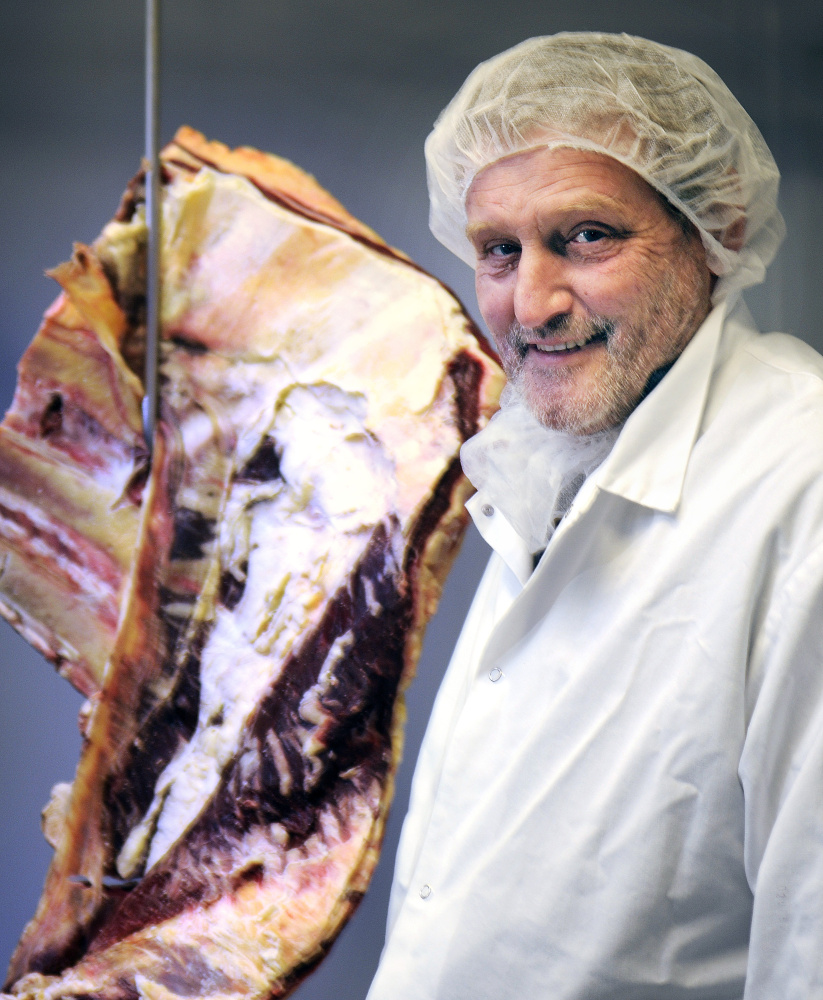GARDINER — Bill Lovely is certain that without the help his company has secured from the Community Development Block Grant Program and the city of Gardiner, Central Maine Meats would not be where it is today.
“It would have taken us five or 10 years more,” Lovely said Wednesday.
He and representatives from two other Gardiner companies, speaking during a public hearing at a Gardiner City Council meeting, talked about the progress they have made in the last year or so, thanks to more than $850,000 in workforce development and economic development grants they have received collectively for hiring and training new workers.
“The programs are geared toward jobs,” said Patrick Wright, who is both executive director of Gardiner Main Street and Gardiner’s economic development coordinator.
They provide upfront capital to businesses that qualify so they can train their workers, Wright said. The workers, who might start out at entry levels, learn skills that make them more valuable employees able to command higher wages.
“Between us and Common Wealth Poultry, we’ve probably brought 60 jobs to Gardiner,” Lovely said.
Central Maine Meats operates a slaughterhouse at the Libby Hill Business Park and a processing facility on Brunswick Avenue for beef, pork and lamb.
Common Wealth Poultry operates a poultry processing facility adjacent to Central Maine Meats in the business park.
“We were the new guys in town, and it was an uphill battle,” Lovely said.
Both companies are USDA-inspected facilities, which means that meat processed there can be shipped out of state. And they are both a part of Gardiner’s strategy to develop itself as a food hub in the state.
But finding people already trained in their jobs has been a challenge, and the grant money — $690,000 for Central Maine Meats and $100,000 for Common Wealth Poultry — have given both companies the ability to train their own workers to meet the needs of their customers, which include wholesalers, supermarkets, restaurants and government agencies.
For Sebago Lake Distillery, the $90,000 grant it secured gave it the ability to pay workers at a critical point in its growth, company CEO Dave Tomer said.
Distilleries are required to secure a location and install equipment before they can seek the permission they need from the federal government to start producing spirits and generating income.
Tomer said the grant allowed the company to hire workers to get its production facility in shape, allowing them to work on getting their spirits to market sooner than they otherwise could. The company is waiting for final approvals and is on schedule to launch its first spirit, a Maine-made rum, next month.
Lost Orchard Brewery’s path has been slightly different.
David Boucher, owner of the hard cider operation, said he’s encountered some learning curves and roadblocks in his bid to carve a niche for himself in the hard cider market.
Boucher had plans for a tasting room and small-scale production facility at the former Congregational Church building that he owns on Church Street. He had added a production facility in South Gardiner. He had received $73,125 to train staff members. In a reorganization, he said, he’s let that go. Now he’s focusing again on small batches to be produced on Church Street.
“It’s been a tough road with distribution, but now we have identified our target markets and we have a new direction,” he said.
The grants, funded by the federal Community Development Block Grant Program, are disbursed and overseen by the state Department of Economic and Community Development.
Andrea Smith, development program manager for the department, said she commended the city for the work it has done to help the companies win the grant money.
“You’re making some great things happen,” Smith said.
Wright said that like presidents, who get more blame or credit for the performance of the economy while they are in office, municipalities are able to accomplish some things to help businesses, but a lot of elements are out of their control.
“What I like about this program,” Wright said, “is that it’s one of the few ways we can have a direct impact on the sustainability of business in our community.”
Jessica Lowell — 621-5632
Twitter: @JLowellKJ
Copy the Story LinkSend questions/comments to the editors.



Success. Please wait for the page to reload. If the page does not reload within 5 seconds, please refresh the page.
Enter your email and password to access comments.
Hi, to comment on stories you must . This profile is in addition to your subscription and website login.
Already have a commenting profile? .
Invalid username/password.
Please check your email to confirm and complete your registration.
Only subscribers are eligible to post comments. Please subscribe or login first for digital access. Here’s why.
Use the form below to reset your password. When you've submitted your account email, we will send an email with a reset code.